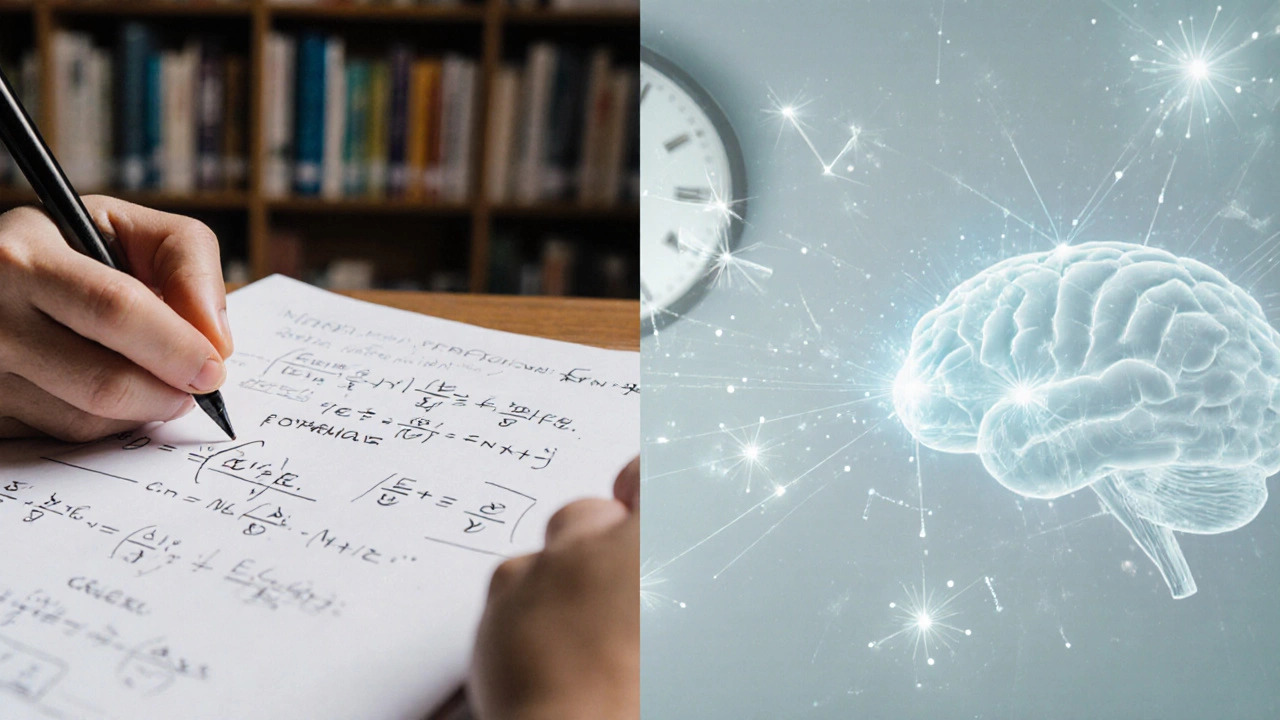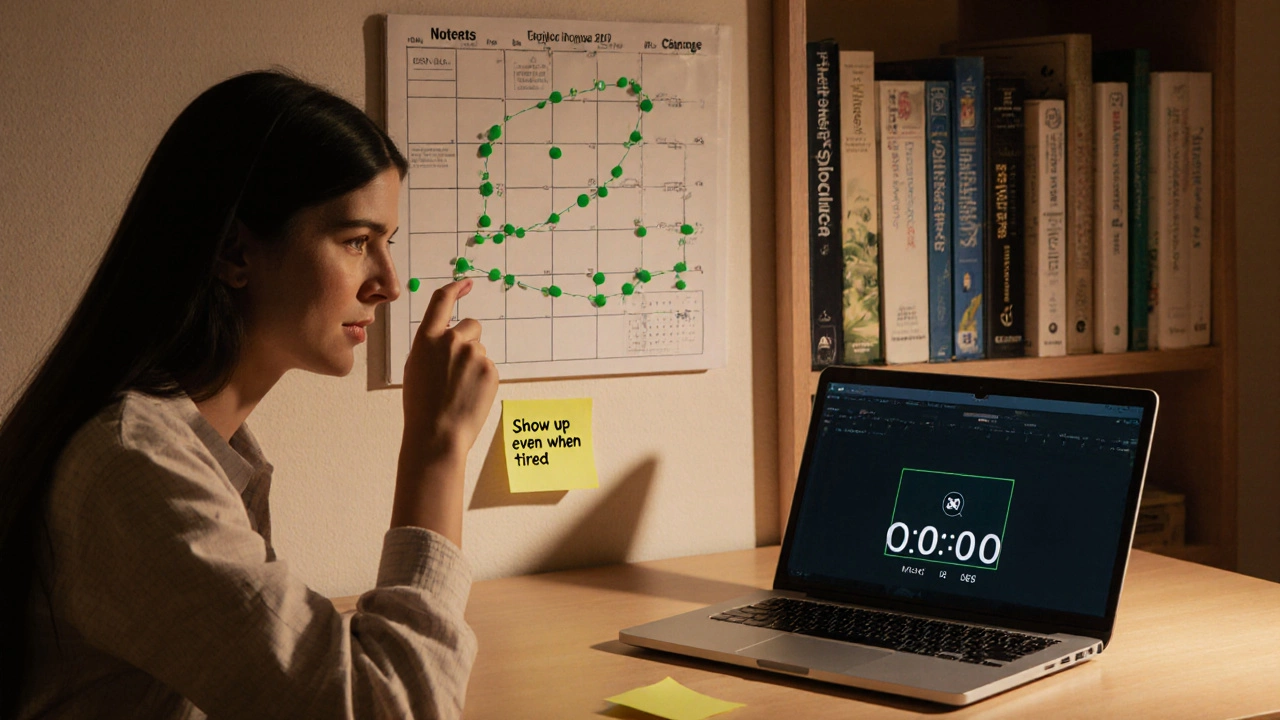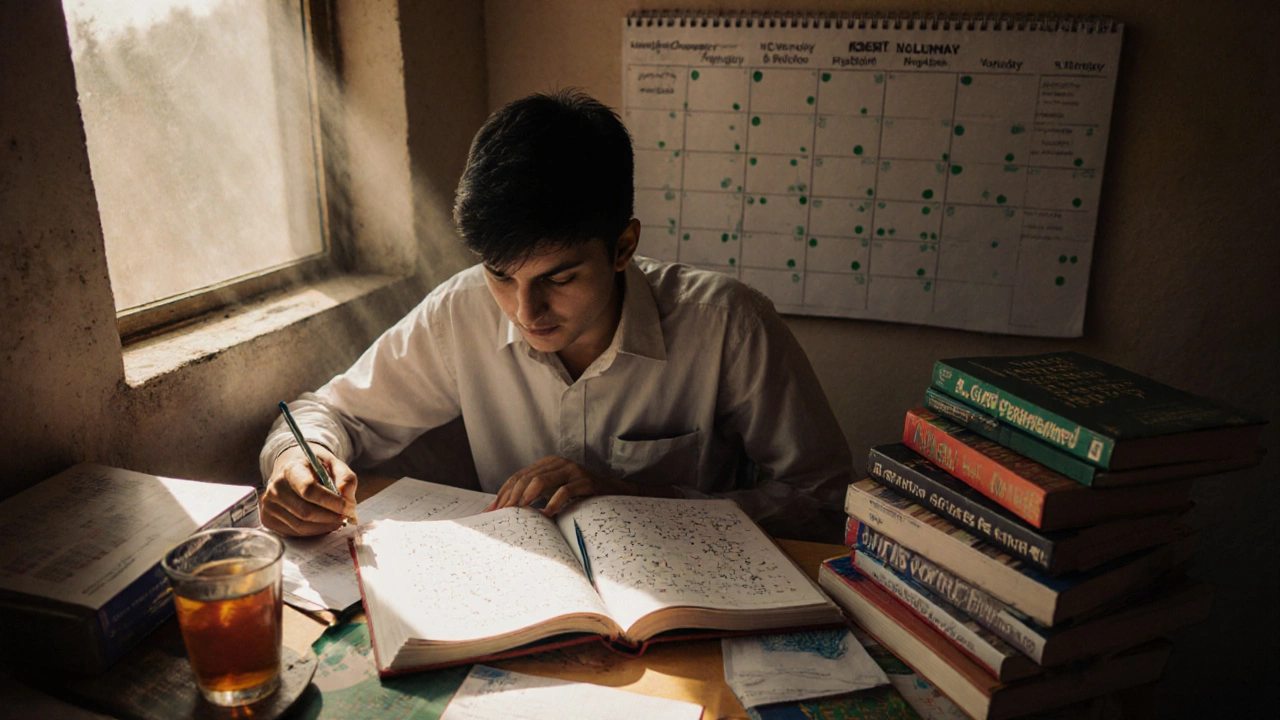JEE Preparation Study Plan Calculator
Create Your Study Plan
Starting IIT JEE preparation feels overwhelming. You’re not alone. Every year, over 1.5 million students in India take the JEE Main exam, and only about 10,000 make it into the top IITs. The competition is fierce, but the path isn’t mysterious. You don’t need to be a genius. You just need a clear plan, consistent effort, and the right resources. This isn’t about studying 18 hours a day. It’s about studying smart, from day one.
Understand the IIT JEE structure
The IIT JEE has two stages: JEE Main and JEE Advanced. JEE Main is the first filter. It’s conducted by the National Testing Agency (NTA) and tests your knowledge in Physics, Chemistry, and Mathematics. If you score above the cutoff (usually around the 90th percentile), you qualify for JEE Advanced. That’s the real gatekeeper to IITs. JEE Advanced is tougher, with more application-based questions and a higher weightage on problem-solving speed and accuracy.
Don’t confuse the two. Many students waste months preparing only for JEE Main, then panic when they see how different JEE Advanced is. Start thinking about both from the beginning. The syllabus is the same, but the depth and style of questions change. JEE Main asks direct formula-based problems. JEE Advanced asks you to combine three concepts in one question - like using calculus in a mechanics problem while applying thermodynamics.
Build your foundation with NCERT
Before you buy 10 reference books, master NCERT. Yes, those thin textbooks you used in Class 11 and 12. They’re not optional. They’re your foundation. Over 70% of JEE Main questions come directly or indirectly from NCERT content. In Chemistry, especially, NCERT is gospel. Every reaction, every diagram, every example - know them cold.
Don’t just read them. Annotate. Draw diagrams. Write out reactions by hand. Make flashcards for organic chemistry mechanisms. If you can’t explain the structure of benzene or the mechanism of SN1 reaction from memory, you’re not ready. NCERT isn’t for last-minute revision. It’s for daily practice. Spend 45 minutes every morning on NCERT before moving to harder problems.
Master the core subjects - one at a time
Each subject in JEE demands a different approach.
Mathematics is about pattern recognition and speed. You can’t memorize your way through calculus or coordinate geometry. You have to solve. Start with basic problems from R.D. Sharma, then move to Cengage or Arihant. Focus on topics that carry the most weight: Calculus (limits, derivatives, integration), Algebra (quadratic equations, sequences, matrices), and Coordinate Geometry. These three make up nearly 50% of the paper. Skip advanced topics like 3D geometry until you’re solid on the basics.
Physics is logic. You need to understand how things work, not just memorize formulas. Start with kinematics, Newton’s laws, and work-energy theorem. These are the building blocks. If you can’t derive the equation of motion from first principles, you’ll struggle later. Use HC Verma - it explains concepts clearly and has graded problems. Don’t skip the theory sections. They’re where the real learning happens.
Chemistry is divided into three parts: Physical, Organic, and Inorganic. Physical Chemistry is math-heavy - stoichiometry, thermodynamics, equilibrium. You need to practice numericals daily. Organic Chemistry is about reactions and mechanisms. Make a flowchart for every functional group. Inorganic Chemistry is memory-based - periodic trends, coordination compounds, qualitative analysis. Use NCERT tables and repeat them aloud. Flashcards work wonders here.
Create a realistic study schedule
Don’t copy someone else’s timetable. Your schedule must fit your life. If you’re in Class 11, aim for 6-7 hours of focused study daily. That’s not 10 hours of scrolling and 2 hours of reading. It’s 6 hours of deep work: 2 hours each for Physics, Chemistry, and Math. Break it into 90-minute blocks with 15-minute breaks. Use the Pomodoro technique: 25 minutes on, 5 minutes off.
Here’s a sample weekly structure:
- Monday: Physics (Mechanics) + Practice Problems
- Tuesday: Chemistry (Organic Reactions) + Flashcards
- Wednesday: Math (Calculus) + 10 Numericals
- Thursday: Physics (Electrostatics) + NCERT Revision
- Friday: Chemistry (Physical) + Numerical Practice
- Saturday: Full-length mock test (JEE Main pattern)
- Sunday: Analyze mistakes + Weak topic review
Every Sunday, review your errors. Keep a mistake journal. Write down why you got a question wrong: Was it a calculation error? Did you misread the question? Did you forget a formula? This is where real improvement happens.

Practice with purpose - not just volume
Doing 100 problems a day doesn’t help if you’re just going through the motions. Quality beats quantity. Pick 10 hard problems and solve them without looking at the solution. If you’re stuck for more than 10 minutes, move on. Come back later. Then check the solution. Don’t just read it - re-solve it yourself. If you can’t do it without help, you don’t understand it.
Start taking full mock tests after 3 months of preparation. Use past JEE Main papers (2019-2025). Time yourself strictly. Simulate exam conditions: no phone, no distractions, no breaks. After each test, spend twice as long analyzing it as you did taking it. Look at your accuracy rate per subject. Are you losing marks in Physics because you skip questions? Are you running out of time in Math? Adjust your strategy.
Stay consistent, not intense
The biggest reason students fail is burnout, not lack of intelligence. You don’t need to study non-stop. You need to show up every day. Even if you only study for 3 hours on a tired day, do it. Consistency builds momentum. Missing one day is okay. Missing three in a row kills your rhythm.
Track your progress. Use a simple calendar. Put a green dot for every day you completed your target. After 30 days, you’ll have a chain. Don’t break the chain. It’s psychological armor against procrastination.
Avoid common mistakes
Here’s what most students get wrong:
- Buying too many books - stick to 2-3 per subject max
- Ignoring NCERT - it’s the base, not the bonus
- Only studying what’s easy - avoid weak topics until it’s too late
- Comparing progress with others - your journey is yours alone
- Waiting for motivation - discipline beats motivation every time
Don’t fall for YouTube shortcuts or ‘7-day JEE crash course’ videos. They’re designed to grab clicks, not teach you. Real preparation takes months. And it’s boring most of the time. That’s normal.

Resources you actually need
You don’t need expensive coaching. You need the right tools:
- NCERT Textbooks - Class 11 and 12 (Physics, Chemistry, Math)
- HC Verma - Concepts of Physics (Vol. 1 & 2)
- R.D. Sharma - Mathematics for Class 11 and 12
- Cengage or Arihant - Subject-specific problem books
- Previous 10 years’ JEE Main papers - Available on NTA website
- Free YouTube channels - Physics Wallah, Unacademy JEE, Khan Academy
Use apps like BYJU’S or Unacademy only for doubt-solving, not as your main resource. Their videos are helpful, but they’re not replacements for practice.
When to start - and when to panic
If you’re in Class 11, you’re on time. If you’re in Class 12, you’re still on time. If you’re in Class 10, start with NCERT and build strong basics. You don’t need to jump into JEE problems yet. Focus on understanding your school syllabus deeply. That’s your foundation.
Don’t panic if you’ve wasted 3 months. Start today. The clock isn’t your enemy. Your consistency is. One hour a day, every day, for 18 months, will get you further than 12 hours a day for 3 months and then quitting.
Final mindset shift
IIT JEE isn’t about being the smartest. It’s about being the most prepared. The student who solves 50 problems correctly every day will beat the one who solves 200 problems with 50% accuracy. It’s about precision, not volume. It’s about understanding, not memorizing. It’s about showing up, even when you’re tired.
Start small. Stick to the plan. Trust the process. The result will follow.
Can I prepare for IIT JEE without coaching?
Yes, many students crack IIT JEE without coaching. Coaching helps with structure and doubt-solving, but it’s not mandatory. You need discipline, a clear plan, and access to the right resources - NCERT, HC Verma, previous papers, and free YouTube lectures. The key is consistent self-study and regular mock tests.
How many hours should I study daily for IIT JEE?
If you’re in Class 11, aim for 6-7 focused hours daily. Break it into 2-hour blocks for each subject. Quality matters more than quantity. Two hours of deep practice with full concentration is better than 5 hours of distracted reading. As you get closer to the exam, increase to 8-9 hours, but never sacrifice sleep or mental health.
Is Class 11 syllabus more important than Class 12 for JEE?
Class 11 forms the foundation. Topics like Mechanics, Algebra, and Chemical Bonding are used repeatedly in Class 12. If you don’t understand Newton’s laws or redox reactions in Class 11, you’ll struggle with Electromagnetism or Electrochemistry later. Spend extra time on Class 11 concepts. They’re the building blocks.
When should I start taking mock tests?
Start taking topic-wise tests after 2-3 months of studying. Take full-length mock tests (JEE Main pattern) after 6 months. Use official NTA papers from 2019 onwards. Analyze every test thoroughly - don’t just check your score. Look at your accuracy, time management, and weak areas. Mock tests are your best diagnostic tool.
Can I crack IIT JEE if I’m weak in Math?
Yes, but you’ll need to work harder on it. Math is the most scoring subject if you practice right. Start with R.D. Sharma basics. Focus on high-weightage topics: Calculus, Algebra, Coordinate Geometry. Solve 5-10 problems daily. Don’t skip them. Use YouTube channels like Physics Wallah for concept clarity. Your strength in Physics and Chemistry can compensate, but Math can’t be ignored.



